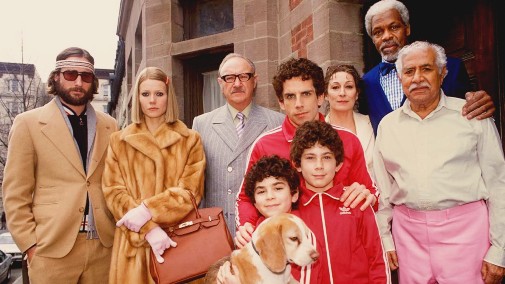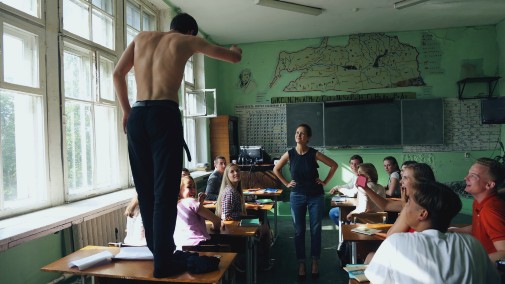Last year, while the Cannes Film Festival did not occur, the organizers revealed a list of titles selected. Wes Anderson's The French Dispatch was among them, and, unlike many other films slotted for the 2020 Croisette, it rescheduled all release plans so it could still premiere at the festival. After a one-year delay, it's finally upon us, and the reviews skew positive. Let's hope it's worth the wait. Another main competition title to take its bow today was Kirill Serebrennikov's Petrov's Flu. It's the Russian director's second film to compete for the Palme d'Or and his first release since a controversial conviction for embezzlement. Still banned from leaving Russia, he attended the festival by FaceTime. More on that later. For now, let's look back at these directors' previous successes – a bittersweet comedy on dysfunctional families and a galvanizing political allegory about modern Russia…

THE ROYAL TENENBAUMS (2001)
As if existing in a pocket dimension of whimsical melancholia, the world of The Royal Tenenbaums is a land of contrasts. Outside, the Autumnal views of New York dominate. Inside, David Wasco's diorama-like sets and the symmetrical compositions invoke vertical labyrinths of palatial spaces, alternatively decorated like a retro Vogue editorial or an over-ornamented kids' room. It's beautiful, for sure, but also fussy, pungent with the scent of arrested development and the flowery decay of fallen American aristocracy. It's the friction between brisk reality and the eccentricity some wear as shields to hide behind, vulnerabilities kept safe and out of sight. While one can easily discard Wes Anderson's cinema as a nightmare of twee superficiality, such visual tensions reveal purpose to the quirk.
Style is the same as content, not its oppositional adversary. This is true here and in all forms of cinema. All the poppy glitz in The Royal Tenenbaums has an underbelly of sadness, the laughs twinkle with the sound of loss. The carnivalesque images highlight the apathy manifest in the characters' faces, their endless disappointments, and casual cruelties. The set is smiling. Why aren't they? Floundering in great expectations that failed to meet their promise, the Tenenbaums and all those who orbit around them are a sad bunch, even if their surroundings speak of nostalgic folly. That's not to say that the film is perfect—some arcs misfire, and the sprawling cast of characters incontrovertibly means there are underdeveloped players.
Still, when it sings, The Royal Tenenbaums sounds like a masterpiece. In his last great role, Gene Hackman is a patriarch unmoored, clownish and greedy, the man's manipulations can't obscure his yearning. Gwyneth Paltrow is similarly sterling as the memorably attired Margot Tenenbaum. Smoking a cigarette like a barely animated corpse, fermenting in ennui, she commands the screen. Margot's storyline with Luke Wilson's Richie is a box full of surprises, most of them heartbreaking, some transcendent, lovely, or funny. When a falcon flies, hair is cut, or a smile flashes across the screen, we're bewitched, bothered, and bewildered. Wes Anderson thus makes his movie's affectations into the weapons by which he devastates and disarms us.
Available to rent from most services, including Amazon Prime Video and Youtube.

THE STUDENT (2016)
During a short period in the mid-2000s, the national government was actively trying to promote, if not support, new Russian artists. This made way for a cadre of bold creatives with experimental intent and progressive politics to rise in prominence. However, by the 2010s, a crescendo of paranoia gave way to an increase in political repression, radical conservatism, and religious zealotry. Gradually, Russian's rising stars in the art world turned into victims of the same state that had hitherto encouraged them. Film and stage director Kirill Serebrennikov is among those artists victimized by Putin's regime. In 2017, he was arrested. While eventually released on a suspended sentence, the verdict against him was widely condemned as a Human Rights violation, and the entire enterprise deemed a show trial.
This context is vital to understanding the director's work, how risky it truly is, and why Serebrennikov might not be inclined towards subtlety. Indeed, there's very little nuance in The Student, a galvanizing nightmare about growing religious fundamentalism in a contemporary Russian school. It all starts inanely enough when a teenaged pupil refuses to participate in swimming classes. A man possessed, Venya is already too far gone when we first encounter him, violently criticizing the immodesty of his bikini-clad classmates. Slowly though, despite increased aggression, his belching of fire and brimstone becomes normalized as authority figures continue to acquiesce to the demands. As it turns out, his open fanaticism was the needed opening for others to reveal latent prejudices and a desire for retrograde authoritarianism.
Only a science teacher stands in his way, gifting the audience with an avatar to follow into this allegory for our modern times. Serebrennikov films The Student as an exercise in anxiety, shooting each scene in elaborate long shots as if attuned to the teacher's growing despair. As the camera keeps moving, trying to keep up with the actors, the chaos on-screen gains the appearance of an unholy ballet. Sermonizing in raged mania, Pyotr Skvortsov has the proper conviction to make Venya's tirades more scary than absurd, and there's disquieting verisimilitude to his vision of a charismatic leader gaining power through a rhetoric of hate. The symbolism of it all is rather obvious, and the ending gilds the lily far too much, but one can't deny The Student's power. Considering Serebrennikov's later prosecution, this film gains retroactive valor, and the critique only feels more pointed.
Streaming on Tubi and Kanopy. You can also rent it on several services.
What are your favorite films from these directors' oeuvres?